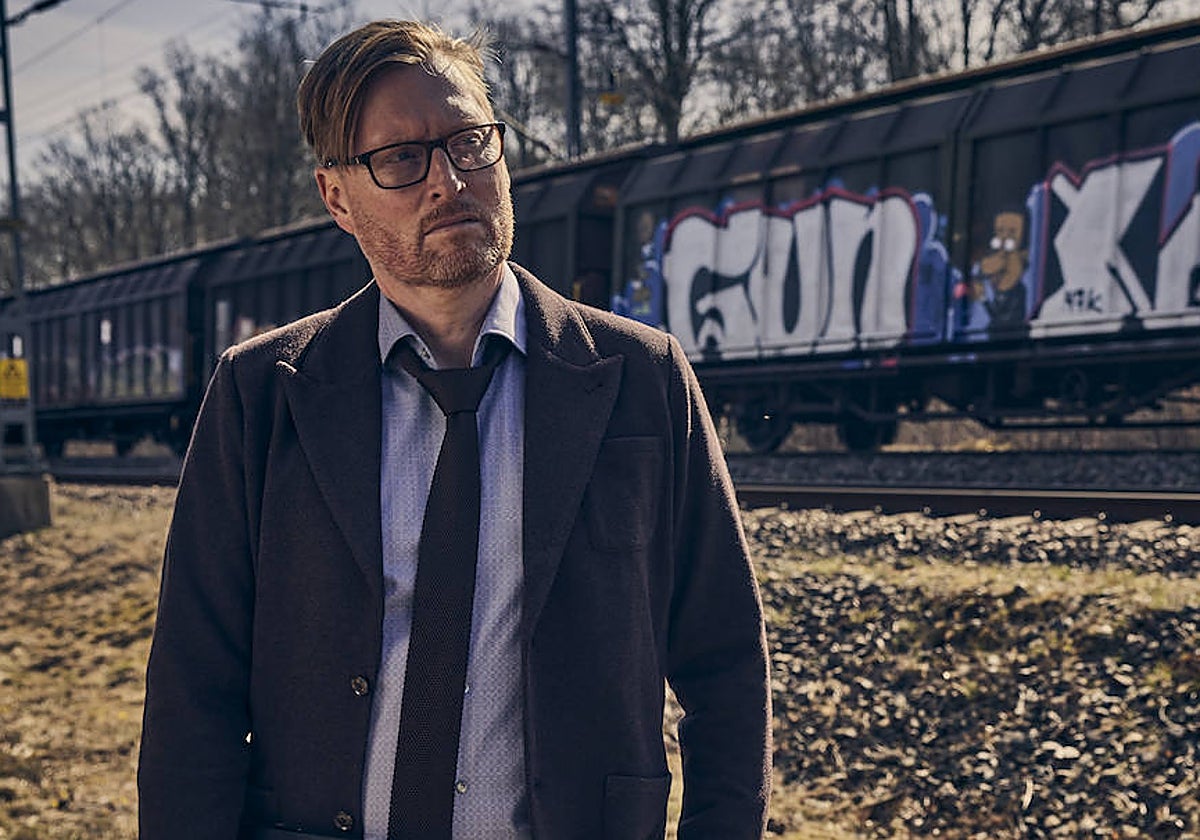From police officer to Nordic noir phenomenon - Anders de la Motte finds inspiration in Malaga
The Swedish writer, who has sold more than three million books, talks about his new detective novel set in the Department of Lost Souls
With three million novels sold, Anders de la Motte (Billesholm, Sweden, 1971), one of the leading masters of Nordic noir, has landed in Spain with Planeta. Together, they have just published the second instalment of his series on the Department of Lost Souls, a unit for odd cases. In The Glass Man, in which he brings back hyperactive inspector Leo Asker.
The Spanish fascination with Nordic crime is matched by the writer's devotion to Spain, particularly to Malaga, where he owns a home. Love for Malaga is shared among other internationally successful authors, such as Norwegian Jo Nesbo and Frenchman Romain Puertolás who have property here too. The latter was also a policeman in another life, a profession shared on his CV by De la Motte himself.
On Tuesday evening he talked about his latest novel at the Andalusian Centre of Letters (CAL) in Malaga. The English translation of The Glass Man will be released on 26 August.
-Is Asker a loser or a winner who resists failure?
-She is a typical hyperactive person who gets impatient when people don't share her high abilities. As a detective, this is a useful characteristic, but it weakens her leadership abilities. Her upbringing taught her perseverance: she is always looking for solutions, however unorthodox they might be. Her personality clashes with some members of the odd cases unit - creating an interesting atmosphere.
-In this second novel there are murders, but it also talks about father-daughter relationships.
-Family relationships are always interesting, because they are the only relationships you can't choose and have to live with. Having a father who taught her the skills that make her good at her job, but also tried to kill her, creates tension and duality in Leo's character.
-Does the Department of Lost Souls really exist?
-Ha ha, I have met many police officers from different countries and they all claim to have a similar department for employees who are somehow broken or have made big mistakes. It's a place to wait out the end of your career. I happen to know that in some Spanish police departments, this unit is called Siberia.
"In some police departments in Spain, this unit is called Siberia"
-Why are we so interested in serial killers?
-Mankind has always been intrigued by the concept of evil. And what could be more evil than a serial killer? I have another theory. In most cases of crime fiction, the bad guys get a punishment that fits the crime. This gives the reader necessary satisfaction and closure which, by contrast, is very hard to find in real life. Especially now in a world which is becoming more confused and disturbed every day. I think that's why people keep coming back to crime fiction. We want answers, we want justice, and we want the good guys to win - which they almost always do in crime fiction.
-Do you write noir because you were a police officer or because you like it?
-Because I like it. But I also write other crime genres. My wife and I write a classic Agatha Christie-style murder mystery series, which I also enjoy.
-Like all writers, first and foremost I'm an avid reader. My mother was a librarian and from an early age I had constant access to books. But yes, sometimes my past in the police force helps me when I write crime novels. Above all, I write as the son of a librarian and a book lover.
-Is the life of police officers in fiction more seductive than in real life?
-Yes, by far. Police work in real life is 90 per cent routine. When you write about it you have to leave those parts out, so as not to bore readers. That said, the remaining 10 per cent of police work can be very unpredictable, exciting and sometimes dangerous. That's the focus of the novels.
-Is the aim of your books to entertain or do they also contain messages?
-Mostly to entertain, although many of the challenges faced by the protagonist are real, like misogyny.
-Are the cases in your books the ones you would have liked to investigate?
-Haha, I wish... But I really enjoy inventing the storylines and then making my characters investigate.
-You've been publishing for a decade and a half, but only two novels have arrived here. Will we keep seeing De la Motte books for years to come?
-Let's hope so. I love my job and I've just signed a deal for a total of ten books in the Asker series.
"It means that I can do what I love most to earn a living, which very few writers can do"
-You have sold three million books. What does success mean to you?
-It means I can do what I love most to earn a living, which very few writers can do. It also allows me to travel the world and meet authors and readers from many countries. Spain is my favourite.
-In Spain there's a fascination with Nordic noir. What do you attribute this interest to?
-Probably a mixture of things. Like the fact that, in terms of population, Scandinavia is made up of relatively small and cold countries, where winter and darkness take over for half the year and wolves, bears, trolls and giants still roam the forests. Probably also the fact that we are considered safe and peaceful countries, which creates an interesting dynamic with crime.
-You bought a house in Malaga. Why?
-One of the advantages of being a writer is that you can work from anywhere. We've had our flat for a year now, where I come to write and enjoy the Spanish culture, food and climate. We love it here, Malaga is a fantastic city. We actually came here on our honeymoon 25 years ago and immediately fell in love with the city and Andalucía.
-Jo Nesbo also lives on the Costa del Sol. Is Malaga good for writing or just for relaxing?
-For both. My wife and I love the fact that there are so many things to do here: museums, restaurants and sightseeing. And your weather is so nice - in winter you have almost two and a half hours more daylight than in southern Sweden, where I live, and probably three and a half hours more than in Norway, where Jo is from. So, as writers, we are much more productive here!
-In Malaga we also have a master of the noir genre, Javier Castillo, who has sold millions of copies. Do you know him?
-Not in person, but I know of him. Spanish crime novels are gaining a lot of international interest lately and I'll try to catch up on some of my reading during my holidays.
"We've had our flat for a year now. We actually came here on our honeymoon 25 years ago and immediately fell in love with the city and Andalucía"
-Here the Swedish woman is a symbol of beauty. What does Spain symbolise for Swedes?
-We are hard-working and sometimes take things too seriously. We love Spain because, other than the culture, food and climate, you generally enjoy life more than we do. I think we'd like to be a bit more like you in that respect. By the way, my wife is half-Italian, so that also has an influence.
-Will there be a novel about a crime in Malaga?
-The more time I spend here, the more chance I have of writing it, of course!

